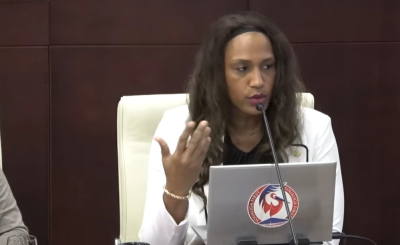 PHILIPSBURG:--- The Ministry of TEATT has uncovered what could only be described as a decade-long disaster in the country’s public transport sector—an industry plagued by mismanagement, corruption, and regulatory negligence. Hundreds of bus and taxi licenses were issued without oversight, verification, or accountability, leaving the system vulnerable to abuse and illegal operations.
PHILIPSBURG:--- The Ministry of TEATT has uncovered what could only be described as a decade-long disaster in the country’s public transport sector—an industry plagued by mismanagement, corruption, and regulatory negligence. Hundreds of bus and taxi licenses were issued without oversight, verification, or accountability, leaving the system vulnerable to abuse and illegal operations.
Bus Licenses: Hundreds Issued Illegally
Data from the Ministry of TEATT shows that of the 300 bus licenses recorded, only 29 buses were actively registered with road tax payments in 2025, leaving over 100 buses potentially operating illegally—or possibly non-existent.
- Individual permits: 129
- Company permits: 9 companies, holding 38 plates collectively
- New bus permits issued in 2023: 87
- Verified with IATA & paid road tax: 66
- Not listed / unverified: 21
- Duplicate licenses: 11, raise questions about true ownership
- Driver demographics:
- Average age: 61
- Most common age: 60
- Oldest: 86, Youngest: 30
- Nationality: Majority Dutch, followed by naturalized Haitians and other Haitian descent
Comparison over the years exposes systemic decline:
- 2013 licenses: Issued in Dutch, stamped physically by the ministry, with unique registration numbers, approval taking nearly a year
- 2023 licenses: Issued in English, no stamps, approval under two months, some without license numbers, automatic expiration clauses inconsistent, and conditions lifted to allow issuance to noncompliant operators
The findings reveal an industry where permits were issued arbitrarily, often on paper only, with no digital trace in official systems, creating fertile ground for exploitation.
Taxi Licenses: Oversaturation and Mismanagement
The taxi sector mirrors the chaos of buses. Of 600 registered taxis, only 454 operators were confirmed compliant through IATA verification and road tax payments.
- New taxi permits in 2023: 136
- Verified among 454: 107
- Unverified: 29
- Additional unknown / unlisted permits: 34+
- Duplicate permits: 2 (one holder deceased)
- Driver demographics:
- Male: 330, Female: 142
- Average age: 60
- Most common age: 60
- Oldest: 91, Youngest: 21
- Predominantly Dutch nationals
The sector suffers from oversaturation, regulatory loopholes, and illegal arrangements—operators holding multiple business names, using third-party insurance, and exceeding fleet limits.
Payment Discrepancies and Plate Issues
T Plates: 137 paid
- Companies: 80 plates among 29 companies
- Individuals: 57 plates among 40 individuals
G Plates: 80 paid
- Companies: 64 plates among 18 companies
- Individuals: 16 plates among 9 individuals
Touring car companies exploited single permits to operate multiple vehicles under different business names, and Chamber of Commerce registrations frequently did not match permit names. Some vehicles were registered in individual names despite company operations, creating legal ambiguity and untraceable activity.
Timeline of Mismanagement
- 2013: Licenses slow, highly regulated, documented
- 2023: Licenses issued rapidly, without physical stamps, inconsistent oversight
- 2024: Annual confirmation process canceled, letters sent to operators
- 2025: Process reinitiated January 8; reminders February 7; compliance deadline February 25, extended to August 8; issuance of confirmation letters suspended August 13–14
This demonstrates years of unchecked issuance, poor planning, and administrative gaps that allowed exploitation to flourish.
Comparisons With Neighboring Islands
Oversaturation is stark compared to nearby territories:
|
Island |
Stay-over Tourists |
Cruise Passengers |
Population |
Taxis |
Buses |
|
St. Martin |
700 |
1.6M |
50,000 |
600 |
300 |
|
Anguilla |
1.4M |
900 |
105 |
535 |
47 |
|
Curaçao |
750K |
800,000 |
152 |
200→250 |
40 |
|
SKB |
104K |
750 |
35,000 |
520 |
Regulated |
The ratio of taxis and buses to population far exceeds these islands, reflecting oversaturation and systemic regulatory failure.
Systemic Failures and Corruption
The ministry’s audit revealed:
- Operators expanding fleets beyond permitted limits
- Vehicles in deplorable condition
- Plate holders driving others’ vehicles
- Duplicate and unregistered permits
- Illegal license renting at exorbitant fees
- Chamber of Commerce discrepancies and arbitrary business names
Former administrations allowed these practices to thrive under the guise of “cleanups,” creating a system vulnerable to abuse, political favoritism, and financial exploitation.
Government Response: Five-Phase Reform Plan
Minister Grisha Heyliger Marten announced:
- Data Verification & Compliance: Completed cleanup, identified dormant and noncompliant permits
- Permit Realization & Driver Certification: Revocation of noncompliant licenses; mandatory certification for safety, knowledge, and medical checks
- Legislative Framework: Drafting amendments to the Passenger Transport Ordinance, piloting digital dispatch systems
- Finalization & Decree: Submission to Parliament to consolidate transport policy
- Transportation Authority: Establish a central authority to regulate and oversee public transport
Timeline:
- 2025: Cleanup & certification
- 2026: Draft law & digital dispatch pilot
- 2027: Final laws passed & transportation authority operational
Minister Heyliger Marten emphasized accountability: “Licenses issued without oversight, rules ignored, and sectors left in chaos… accountability is necessary if we are to rebuild trust.”
Conclusion: Rebuilding Trust Amid Chaos
The investigation exposes a sector long plagued by corruption, negligence, and outdated laws. Hundreds of licenses issued without oversight, operators exploiting loopholes, and vehicles in unsafe conditions highlight systemic failure.
The ministry’s phased reform seeks to restore order, transparency, and fairness. But after years of exploitation and administrative neglect, the public will be watching closely. The question remains: can the government enforce compliance and rebuild trust, or will public transport continue to be a playground for corruption?
One thing is clear: the rot runs deep, and without decisive action, accountability, and modernization, the chaos is far from over.












